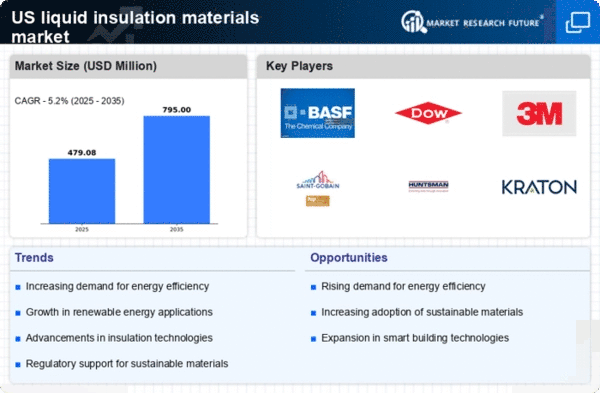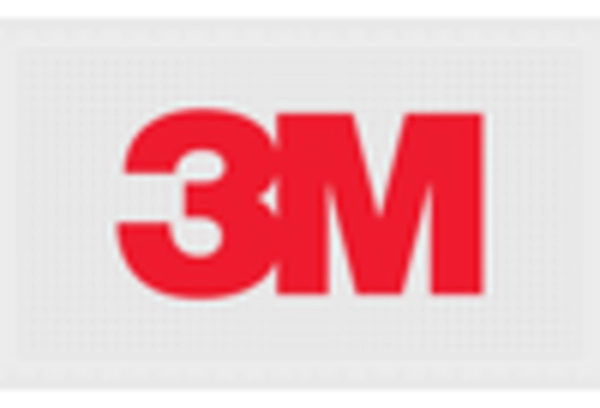The liquid insulation-material market is characterized by a dynamic competitive landscape, driven by increasing demand for energy-efficient solutions and advancements in material technology. Key players such as Dow Inc. (US), 3M Company (US), and BASF SE (DE) are strategically positioned to leverage innovation and sustainability in their operations. Dow Inc. (US) focuses on enhancing its product portfolio through research and development, aiming to provide high-performance insulation materials that meet stringent regulatory standards. Meanwhile, 3M Company (US) emphasizes digital transformation and smart manufacturing processes to optimize production efficiency and reduce environmental impact. BASF SE (DE) is actively pursuing partnerships to expand its market reach and enhance its product offerings, indicating a collaborative approach to growth in this sector.The market structure appears moderately fragmented, with several players competing for market share through localized manufacturing and supply chain optimization. This competitive environment is shaped by the collective influence of major companies, which are increasingly adopting strategies that prioritize sustainability and technological advancement. The focus on localizing production not only reduces transportation costs but also aligns with the growing consumer preference for environmentally friendly products, thereby enhancing brand loyalty and market penetration.
In October Dow Inc. (US) announced the launch of a new line of bio-based insulation materials, which are designed to reduce carbon emissions by up to 30% compared to traditional products. This strategic move underscores Dow's commitment to sustainability and positions the company as a leader in eco-friendly insulation solutions. The introduction of these materials is likely to attract environmentally conscious consumers and could potentially reshape market dynamics by setting new benchmarks for sustainability in the industry.
In September 3M Company (US) unveiled a state-of-the-art manufacturing facility dedicated to producing advanced insulation materials with enhanced thermal performance. This facility is expected to increase production capacity by 25%, allowing 3M to meet the rising demand for high-performance insulation solutions. The investment in advanced manufacturing technology not only boosts operational efficiency but also reinforces 3M's competitive edge in a market that increasingly values innovation and quality.
In August BASF SE (DE) entered into a strategic partnership with a leading renewable energy firm to develop insulation materials specifically designed for solar energy applications. This collaboration aims to create products that enhance the efficiency of solar panels while providing superior insulation properties. Such strategic alliances are indicative of a broader trend towards integrating renewable energy solutions with traditional insulation materials, reflecting the industry's shift towards sustainability and innovation.
As of November the competitive trends in the liquid insulation-material market are increasingly defined by digitalization, sustainability, and the integration of artificial intelligence in manufacturing processes. Strategic alliances are playing a crucial role in shaping the current landscape, enabling companies to pool resources and expertise to drive innovation. Looking ahead, competitive differentiation is likely to evolve from traditional price-based competition to a focus on technological advancements, product innovation, and supply chain reliability. This shift suggests that companies that prioritize sustainability and invest in cutting-edge technologies will be better positioned to thrive in an increasingly competitive market.
















